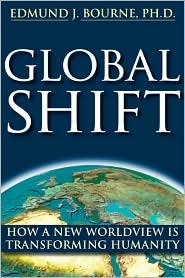 Titles are important. This book was an excellent survey of emerging philosophies and practices, but it did not convince me that a “global shift” is really taking place, or that, as the subtitle promises, a “new worldview is transforming humanity”. I still enjoyed reading the book, and found some very interesting ideas in it. I just found that the title, while attention-grabbing, oversold the contents and set up unrealistic expectations.
Titles are important. This book was an excellent survey of emerging philosophies and practices, but it did not convince me that a “global shift” is really taking place, or that, as the subtitle promises, a “new worldview is transforming humanity”. I still enjoyed reading the book, and found some very interesting ideas in it. I just found that the title, while attention-grabbing, oversold the contents and set up unrealistic expectations.
The book is published by an imprint of the Institute of Noetic Sciences, which defines itself as follows:
The word “noetic” comes from the ancient Greek nous, for which there is no exact equivalent in English. It refers to “inner knowing,” a kind of intuitive consciousness—direct and immediate access to knowledge beyond what is available to our normal senses and the power of reason.
The book claims that a shift is taking place in various disciplines towards this kind of intuitive consciousness and a new approach to life. Some of the key points in this shift are:
- Development of a respectful and cooperative relationship with nature
- Increased sense of connection and communion for all peoples
- Greater compassion for all beings
- Decline of consumerism
- Valuing of intuitive knowledge
- A natural ethics based in compassion
- Emergence of a global consciousness
The book then describes some conceptual shifts that are necessary to support these changing attitudes:
- Nature is conscious and exhibits attributes of consciousness at all levels from atoms to galaxies
- Reality is larger than the observable physical universe, and contains multiple nonphysical dimensions
- Knowledge based on intuition is just as valid and necessary as empirical knowledge based on the senses
- All of us are joined as one; nothing is independent of any other thing
- Feminine values of interdependency, cooperation and respect for the earth are a central part of the worldview
- The basis for ethics is not found in socially constructed rules relative to each culture but in the natural order of the universe
These conceptual shifts in turn lead to value shifts:
- Increased reverence and respect for the earth and all forms of life on it
- Increased compassion rather than prejudice toward people whose race/nationality/religion/ethnic group/economic status differs from our own
- Greater priority given to personal and spiritual growth than to materialistic values of acquisition and consumption
- Embracing nonlinear, intuitive ways of knowing the world
- Honouring unconditional love and forgiveness as the highest values in all of our relations with others
Finally, these value shifts lead to new actions:
- Simplify your life
- Learn communication skills that promote compassion and understanding
- Transition your diet from processed to whole organic foods
- Take time out from stress to relax every day
- Exercise regularly to discharge tension
- Visualise and deeply affirm a goal
- Reframe your attitude toward negative experiences
- Help the earth and disadvantaged people
At the end of the book, there’s some advice on how to take each of these actions on a practical level. For example, you could simplify your life by downsizing your living space, letting go of clutter, doing what you want for a living, reducing your commute, reducing exposure to TV and computer screens, living closer to nature, not always answering the phone, delegating chores and learning to say no. Improve your diet by shifting to organic, whole foods and more vegetables. Have protein as 25-30% of the total calories, fat as 25-30% and carbohydrate as 40-50%. Chew each bite 10 to 20 times before swallowing, to get maximum nutrition. Relax by spending an hour a day doing nothing, not even reading or watching TV – just experiencing silence.
I think that if the shift really were occurring globally, it would be a fantastic thing. I agreed with a lot of what I read in the book, and the changes it describes are very positive. But when I read the news, I just don’t see these values becoming dominant. I see the reverse – consumerism becoming more rampant, nature being ravaged, compassion being stamped out by ignorant tabloid headlines, people living disconnected from each other, from nature and from their own selves.
Am I cynical? Or unaware of this great shift taking place? All I know is that the book described a lot of things I agreed with and I wish they were more widely practised. The only real evidence presented for a real global shift is a few survey results and statistics on things like people practising yoga or meditation. But these numbers are surely dwarved by the millions of people hurtling headlong into consumerism and material accumulation. I thought the motivations given for making the shift were very telling:
- Life crisis
- Burnout with material values
- Peak experiences (heightened awareness at important times, e.g. the birth of a child)
- Peer influence
- Education (books, magazines, internet)
The only people suffering burnout with material values are those in privileged positions in rich countries, i.e. a very small minority of the world’s population. These are the same people who have the most access to books, magazines and the internet, and for whom peer influence encourages them to do things like eating organic food. The majority of the world’s population is desperate for more wealth. For every rich Westerner quitting his corporate job and doing yoga and meditation, there must be a thousand people in developing countries leaving their traditional way of life behind, moving to cities and trying to make enough money to be able to afford a bit of consumerism. The shift described in the book seems to result from a sickness with material excess, something that I, as a privileged person in a rich country, can fully identify with. But this is not the reality for most people in the world. They are not at the far end of capitalism, wondering what next after all this accumulation of wealth. They are at the beginning, having been shut out for centuries by the inequities of imperialism and its descendants. Try telling someone living on a dollar a day to give greater priority to personal and spiritual growth than to acquisition and consumption.
All of these criticisms could have been avoided if the title hadn’t made such a broad claim. The book is describing real changes that are taking place among certain groups of people in certain countries. There are some great local environmental initiatives, transition towns, local currencies, cooperatives, etc etc etc. But to call it a global shift is taking it too far, and invites criticisms that detract from the important ideas the book presents.


